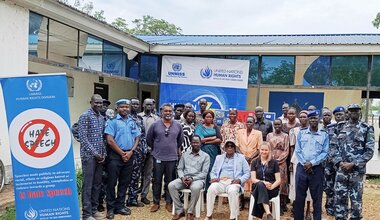From revenge to resolution - mobile court inspires change in conflict management in Greater Pibor
GREATER PIBOR - South Sudan’s justice system was left in tatters after decades of civil war, leaving marginalized communities with only limited access to formal courts. As reliance on traditional courts often proves insufficient for complex cases, many cases have been put on hold indefinitely.
In Greater Pibor, the absence of a permanent formal justice has led to many negative consequences.
“The lack of rule of rule of law is a key driver of insecurity, leading communities to resolve disputes through any means they deem necessary,” stated High Court Judge Sebit Bullen. “For many, these means are revenge killings and age-set fighting, with the latter having become increasingly violent over the past months.”
To prevent conflict and strengthen stability, an UNMISS-supported mobile court was deployed to the Greater Pibor Administrative Area for twenty-two days to process more than 400 cases that had not been heard.
So far, the court has resolved 37 cases, comprising 22 criminal and 15 civil hearings. While many are still to be heard, beneficiaries of this process are welcoming the return of justice to a place where it has been absent for far too long.
“I am satisfied that we have had access to legal recourse. The judgement rendered in the murder of my sister’s son is just,” says complainant James Baba Thabeono.
“In addition to the prison sentence, the offender’s obligation to pay 50 cows as blood compensation demonstrates the efficacy of the law. This outcome proves the usefulness of the legal system, rendering the practice of taking the law into our own hands obsolete.”
He urged all community members to reject retaliatory killings and instead seek accountability through legal channels.
A functioning formal justice system is one of the pillars of individual rights and liberties, according to the UN Charter and the South Sudan Reconciliation, Stabilization, and Resilience Trust Fund. This latter initiative, which provides the framework for UNMISS support in this context, aims to address the complex challenges the country is facing through strategic resource alignment and integrated programming, tackling the root cause of conflict, promoting locally owned peace agreements, and enhancing resilience.
The effective alignment with this aim and important impact of the specialized mobile courts on peace and security in the region is further illustrated by the area’s chief administrator, Peter Guzule Maze, who attested that “community members are now more cautious about committing crimes due to the fear of being held accountable by the law. Prior to the court’s deployment, mischievous youths would move around firing guns randomly, a practice that ceased during the court’s presence.”
“Mobile courts are vital in promoting access to justice for communities lacking permanent formal justice systems. UNMISS and its partners will continue to support the people of South Sudan in ensuring access to justice for all,” said UNMISS Director of Rule of Law and Security Institutions, Anees Ahmed.
 UN
UN United Nations Peacekeeping
United Nations Peacekeeping





